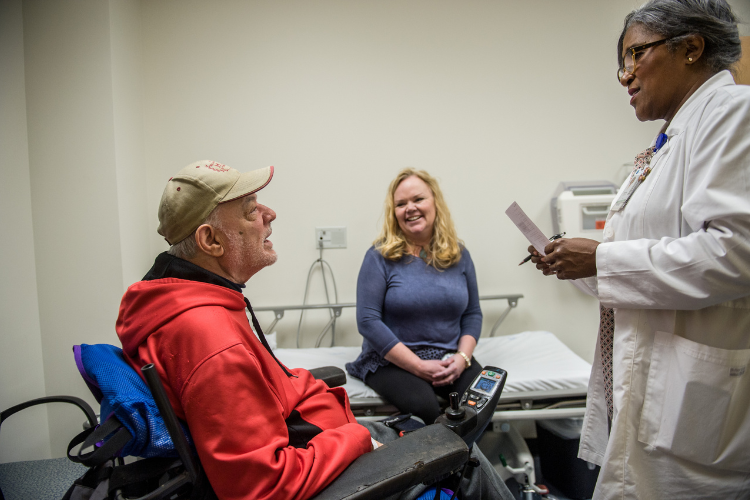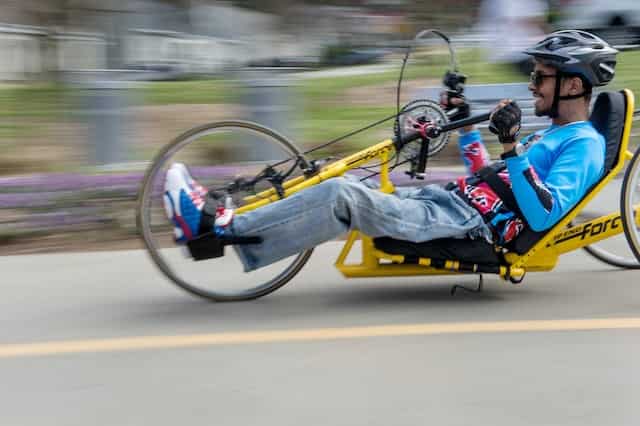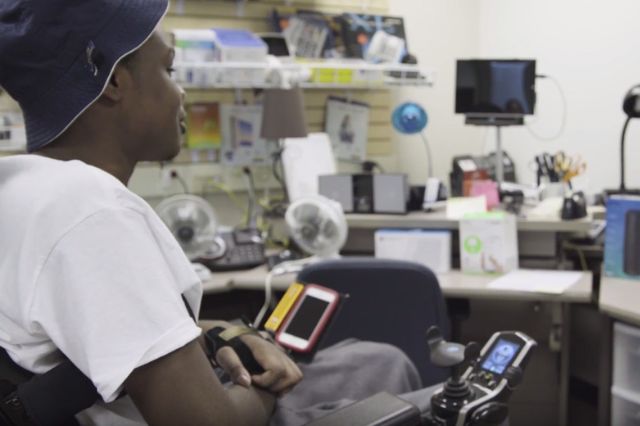Specialized Urology Care at Shepherd Center
Long-term management of the bladder following a neurologic injury or disease process
The Urology Clinic at Shepherd Center offers specialized outpatient care focused on the long-term management of complex urinary complications, such as neurogenic bladder, resulting from spinal cord injuries, brain injuries, or other neurological conditions like stroke or multiple sclerosis.
Whether you seek relief from urinary incontinence, urinary retention, frequent urinary tract infections (UTIs), or other urinary complications, we aim to empower you to regain control over your bladder function and improve your quality of life through personalized care and advanced treatment options.

Our Approach to Neurogenic Bladder Management
Every individual's neurogenic bladder is unique, which is why our approach to neurogenic bladder management is based on each patient's specific needs and goals. Our care team will consider various factors, such as the level of injury, neurological function, and individual goals, to develop a comprehensive care plan. Recommended treatments may include interventions, such as pelvic floor exercises to strengthen bladder control, catheterization techniques for bladder emptying, Botox injections to alleviate overactive bladder symptoms, and more.
Appointments and Referrals to the Urology Clinic
It can be overwhelming dealing with a neurogenic bladder and urinary incontinence, and we want to help you feel like you have control over your life. Whether you are a new patient, an existing patient, or a referring provider, our team will work with you to develop a personalized care plan.
A Team Approach to Your Urology Care
Complex neurological injuries can significantly impact urinary function, leading to various challenges and concerns. That’s why we take a multidisciplinary approach at the Urology Clinic, collaborating closely with urologists, neurologists, physical therapists, and other specialists to ensure the highest standard of care. Together, we ensure a comprehensive approach to your care, focusing on treating immediate symptoms and providing the most effective and evidence-based treatment options to optimize bladder function and prevent complications.

Frequently Asked Questions
The Urology Clinic at Shepherd Center is a specialized outpatient clinic focused on the long-term management of complex urinary complications, such as neurogenic bladder, resulting from spinal cord injuries, brain injuries, or other neurological conditions like stroke or multiple sclerosis.
Our clinic offers a wide range of comprehensive rehabilitation services designed to address the broader impact of neurogenic bladder. We aim to provide specialized care to help prevent urinary tract infections (UTIs), preserve kidney health, minimize urological complications, and achieve urinary continence.
The Urology Clinic at Shepherd Center caters to individuals at different stages of their neurological rehabilitation journey seeking relief from urinary incontinence, urinary retention, frequent urinary tract infections (UTIs), or other urinary complications. This primarily impacts individuals with spinal cord injury, brain injury, or other neurological conditions like stroke or multiple sclerosis.
The Urology Clinic at Shepherd Center is a dedicated one-stop shop for specialized urological care related to neurological injuries or conditions.
As a patient at the Urology Clinic, you have a specialized, multidisciplinary care team of highly skilled neurogenic bladder specialists who collaborate to design a tailored, evidence-based treatment plan based on your symptoms and goals.
This comprehensive approach helps you mitigate long-term complications while improving overall bladder control and quality of life.
The Urology Clinic at Shepherd Center offers specialized outpatient care for individuals who have experienced spinal cord injuries, brain injuries, or other neurological conditions like stroke or multiple sclerosis.
Neurogenic bladder presents a range of symptoms that can vary from person to person. The primary indication of neurogenic bladder is urinary incontinence or difficulty in controlling urine flow. Other common symptoms that may arise include:
- Challenges in completely emptying the bladder after urination.
- Difficulty initiating the urination process.
- Inability to perceive when the bladder is full.
- Frequent urination exceeding what is considered normal.
- Sudden and intense urges to empty the bladder.
- Urine leakage leading to unintentional urine release.
If you are encountering symptoms such as severe pain, blood in the urine, or an inability to urinate, you must seek immediate medical attention. We strongly advise you to prioritize a visit to urgent care or the emergency room rather than waiting for a scheduled appointment at the Urology Clinic.
Our highly skilled urologists specialize in diagnosing neurogenic bladder and will conduct a thorough assessment to gain a comprehensive understanding of your condition. This may involve taking a detailed medical history, conducting a brief flow study, performing a pelvic floor examination, and discussing your symptoms.
Following the assessment, we may recommend additional tests to confirm the diagnosis of neurogenic bladder. These may include bladder function tests such as video and water urodynamic studies, which provide valuable insights into how your bladder functions and how effectively it stores urine.
Effective management of neurogenic bladder and urinary incontinence often does not require surgery and can be achieved through various non-invasive or minimally invasive treatment options. Working closely with your urologist and neurogenic bladder specialist, you can expect a comprehensive approach that addresses your needs. Some common treatments may include:
- Catheter Management
- Intermittent Catheterization
- Botox Injections
- Erectile Dysfunction Evaluation and Treatment
- Suprapubic Catheter Placements
- Electrical Stimulation and Pelvic Floor Exercises
- Medication
- Urethral Balking Agents
- Behavioral or Biofeedback Techniques
If you are encountering symptoms such as severe pain, blood in the urine, or an inability to urinate, you must seek immediate medical attention. We strongly advise you to prioritize a visit to urgent care or the emergency room rather than waiting for a scheduled appointment at the Urology Clinic.
Yes, we would love to see you, your friends and family. Learn more about how to request an appointment.
A medical referral from a healthcare provider is encouraged but not required for new patient evaluations. The completed medical referral and pertinent medical records can be faxed to 404-350-7356. Visit our Appointments and Referrals page to learn more about requesting an appointment with the Urology Clinic.
The Urology Clinic is currently accepting new patients. A medical referral from a healthcare provider is encouraged but not required for new patient evaluations. You can make a new patient appointment by calling our clinic at 404-355-1144 from 8:30 a.m. to 4:00 p.m. ET, Monday through Friday. Referrals can also be faxed to us at 404-350-7356.
Your first appointment will include a thorough assessment and evaluation of your condition and any complications you may be experiencing. This evaluation may include a comprehensive medical history, pelvic floor examination, and a brief flow study to determine your condition’s extent and identify improvement areas.
Once the assessment is complete, the care team works with you to set realistic goals tailored to your condition, lifestyle, and preferences. These goals may include minimizing complications, achieving urinary continence, or optimizing quality of life.We want to make the most of your visit here just as much as you do. Here are some tips on what to do before your first evaluation.
- List questions and topics you'd like to discuss with your care team.
- List of injuries you’ve had.
Document the symptoms you are experiencing and for how long. - Bring a partner, family member, or friend who can act as a second set of ears, take notes and prompt you if you forget anything.
- Ask for clarity on anything you don't understand. Medical terms can be daunting, and we want you to feel confident while you're here and after you leave.
For your first evaluation appointment, please also bring with you the following:
- Driver’s license
- Medical insurance card
Absolutely. It is very helpful if a caregiver or health advocate accompanies you to your appointment to help take notes, ask questions, and provide emotional support.
It is very important that you attend all scheduled appointments. Availability in the Urology Clinic is limited, and a missed appointment can impact timely treatments.
While we understand that emergencies and other unexpected situations do arise, the Urology Clinic requests you provide us with a 24-hour notice in the event you are unable to make an appointment and need to reschedule.Please arrive 30 minutes ahead of your appointment time.
If you arrive less than 15 minutes before your appointment time, we may need to reschedule your appointment. Your time with the provider is very important and arriving 15 minutes before your appointment time ensures that our nursing staff can prepare you for your visit and the providers are able to meet all your needs.
The Urology Clinic accepts most major health plans, including traditional insurance, managed care plans, Medicare, and Georgia Medicaid. We encourage you to confirm that your health plan covers specialist services before making an appointment.
Please call our Financial Services Department at 404-350-7320 Monday through Friday to ask questions about your statement.
The Urology Clinic is conveniently located on the main campus of Shepherd Center in Buckhead Atlanta, next to Piedmont Hospital. We are easily accessible from Interstates 75/85 and just 16 miles from Hartsfield-Jackson Atlanta International Airport.
If you are arriving for a new evaluation or any of our medical services, you will check in at the Speciality Services Clinic on the first floor of the main Shepherd Center building. Upon entering Shepherd Center via the visitors’ parking bridge, continue down the hall, turning left at the Security Desk. The Specialty Clinic is just past the coffee kiosk.
Yes. Free and convenient covered parking is available for all patients in the Shepherd parking deck behind Shepherd Center.
Yes. ADA parking is available on all garage levels, with van-accessible spaces on the ground level. Direct access to the hospital is accessible by an elevator on each level of the parking deck.
Patients can also be picked up or dropped off adjacent to the Marcus-Woodruff Building Entrance. Transport chairs may be borrowed from our Security Desk if needed by visitors.
The Urology Clinic and Shepherd Center have partnered with several nearby hotels to offer discount room rates for patients and/or family members. Rates may be subject to room availability. Each hotel offers various services, including wheelchair-accessible guest rooms for persons with disabilities. Be sure to ask for the Shepherd Center Rate when contacting these hotels.




